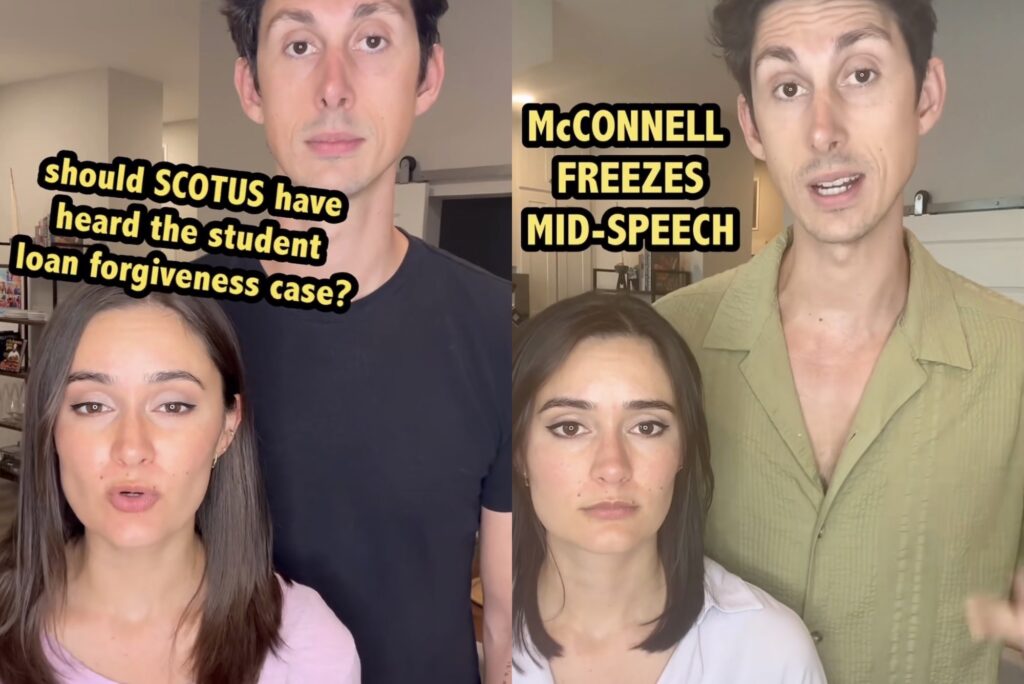(LOS ANGELES) — With over 1.1 million followers on TikTok, husband and wife Maclen and Ashleigh Ruggles Stanley are on a mission to demystify the law. The duo, known as “the.law.says.what,” tackles legal questions that arise from current events. While they refer to themselves as “educators,” their work does fall into a gray area of journalism, prompting the question: Are they journalists?
Maclen and Ashleigh post minute-long videos that are broken up into two parts. Initially, they delve into a newsworthy event, occasionally incorporating video clips to provide context. Next, they’ll explain the event through a legal lens. Was this person breaking the law? Is this proposed amendment constitutional?
Attorneys, educators, content creators? Definitely. Journalists? I think so. If journalism is defined as “the gathering, processing, and distribution of news and information, and the manner in which news and information is presented to an audience,” Maclen and Ashleigh’s work meets that criteria. In fact, their legal commentary actually offers a more unique perspective on news than traditional journalists.
In one TikTok, Maclen and Ashleigh explain how, in a post-Roe v Wade Texas, some state lawmakers are trying to make it illegal to travel out of the state to get an abortion. The couple go on to explain why a law like this would be unconstitutional: because one state’s laws can’t take precedence over another and because preventing someone from going out of state is inherently unconstitutional (with few exceptions.) Many of the comments on the video make it clear that this is the first time the viewer has heard about what these lawmakers are attempting to do. This proves their value as journalists.
Additionally, without the added legal context of the proposed out-of-state abortion ban, the viewer might assume that a restriction like this is feasible. Maclen and Ashleigh explained why it is unlikely to be passed as a law.
The couple met at Harvard Law School where they graduated in 2018. According to a profile of the couple by Harvard Law Today, Maclen has his own firm and Ashleigh works in entertainment law. They originally started their TikTok page to promote Maclen’s book The Law Says What?: Stuff You Didn’t Know about the Law (but Really Should!). In the profile, they talk about how it wasn’t their intention to start a page where they share and analyze current events, but that’s what it turned into.
“I think this experience has made us realize information sharing matters — whether it’s a professor job later, or a TV show, or more books, or only ever on TikTok and YouTube,” Ashleigh told Harvard Law Today. “We’ve both been pleasantly surprised by how much reach you can have just through these platforms.”
As far as I can tell, Maclen and Ashleigh have never referred to themselves as journalists– “educators” seems to be their preferred label. With that in mind, their journalistic integrity could be called into question. If they’re not thinking like journalists, they’re probably not purposefully following any sort of journalistic code of ethics. However, their viewers do hold them to the same standard as they would most journalists. Maclen and Ashleigh recently made a video addressing comments they received on a few videos that they’re too pro-police and, by other viewers, too anti-police. Ashleigh responded by saying, “we always do our best to stay objective and review the law as it is.”
When consuming news that might fall into the gray area of journalism, it’s important to remember that the journalists (whether they embrace that title or not) might not have the same resources as more traditional publications. While I do not doubt that Maclen and Ashleigh do thorough research before posting a TikTok, they’re not operating under a system of checks and balances. They don’t have professional fact-checkers or editors. They decide what information to include or exclude. Journalists like them might require more protection under the First Amendment. But are they entitled to it? I bet Maclen and Ashleigh would know the answer.
In this evolving digital age, content creators like Maclen and Ashleigh on TikTok challenge traditional journalism norms. Their engaging content brings legal insights to a wide audience, prompting important discussions about the role and responsibilities of modern information sharers. As we navigate this gray area, their impact urges us to reconsider the boundaries of journalism.


